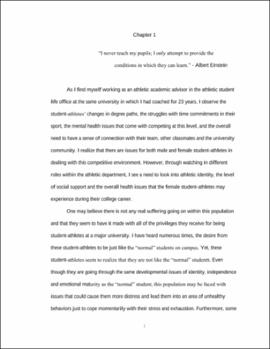| dc.contributor.advisor | Dancy, Elon T | |
| dc.creator | Ludvigson, Carol Lee | |
| dc.date.accessioned | 2019-06-03T20:35:50Z | |
| dc.date.available | 2019-06-03T20:35:50Z | |
| dc.date.issued | 2013 | |
| dc.identifier | 99239665402042 | |
| dc.identifier.uri | https://hdl.handle.net/11244/320223 | |
| dc.description.abstract |   | |
| dc.description.abstract | Although many student-athletes find participation in college sports rewarding, there are many who experience difficulties. Student-athletes face the same concerns that nonathletes do which include becoming independent, coping with uncertainty, finding a clear purpose, and clarifying values (Astin, 1977; Chickering, 1969; Farnsworth, 1966; Pascarella & Terenzini, 2005). Social isolation, identity conflicts, and fear of failure become a reality for these student-athletes (Pinkerton, Hinz, & Barrow, 1989), consequently, student-athletes are at a possible risk to experience a wide range of distressful reactions linked to mental health. Many athletic departments are quick to handle an injury but not to handle emotional issues. For this reason, exploring the relationship between these factors of athletic identity and social support can provide new important information to individuals working with these student-athletes (e.g., sport psychologists, academic advisors, coaches, trainers). | |
| dc.description.abstract | In a time when females are found to score lower in self-esteem, it is of vital importance that relationships and social support be strong and significant (Todd, 2003). Research has supported the theory that female student-athletes report higher levels of depressive symptoms, social anxiety and non-support than their male counterparts (Storch, 2008). There have been reports of higher levels of high risk drinking and depressive symptoms in female student-athletes (Zamboanga, 2008). | |
| dc.description.abstract | The purpose of this study was to examine the health risk behaviors of female student-athletes and the relationship these behaviors have to their social support and athletic identity. The sample consisted of 190 female student-athletes in order to provide insight and data about the health risk behaviors of female student-athletes in Division I athletics. The sample was formed into two groups by type of sport. Group one was considered a team sport and included softball, basketball, volleyball, rowing and soccer. Group two was considered an individual sport and included golf, tennis, track, and gymnastics. | |
| dc.description.abstract | Following are the significant correlations identified in this study: Sport had a moderate relationship with social support and a low but significant negative relationship with alcohol and eating disorders. GPA had a moderate to strong relationship with social support and a negative relationship with marijuana. Social support had a moderate relationship with HRB and a low but significant negative relationship with marijuana and alcohol. Athletic identity had a strong and moderate relationship with stress, HRB and alcohol and a low but significant relationship with depression. Stress had a strong relationship with depression and a low but significant relationship with alcohol. Marijuana and alcohol had a strong relationship with one another. Eating disorders and depression had a moderate relationship with one another. Significant ANOVA results are that group 1 scored higher than group 2 on alcohol use, and group 2 score higher than group 1 on eating disorders. Significant MANOVA results are: Reported Social Identity was greater in the team sport than the individual sport. Reported Exclusivity was greater in the individual sport than the team sport. Reported Social Support Quantity, Social Support Quality and Total Social Support, was higher in the Individual sport than the Team sport. | |
| dc.description.abstract | Two regression models were formed using the totals of the Social Support Scale (Social Support Quality, Social Support Quantity) and the Athletic Identity Measurement Scale (SI-Social Identity, EX - Exclusivity, NA - negative affectivity of athletic identity). Results were that the variable of social support was the only significant predictor of GPA and had a medium effect. Both variables social support and athletic identity were significant predictors of HRB, with social support having a medium effect and athletic identity having a strong effect. | |
| dc.description.abstract |   | |
| dc.format.extent | 173 pages | |
| dc.format.medium | application.pdf | |
| dc.language | en_US | |
| dc.relation.requires | Adobe Acrobat Reader | |
| dc.subject | Health behavior | |
| dc.subject | College athletes--Health risk assessment | |
| dc.title | Health Risk Behaviors of Female Student-Athletes and the Relationship to Social Support and Athletic Identity | |
| dc.type | text | |
| dc.type | document | |
| dc.thesis.degree | Ph.D. | |
| ou.group | Jeannine Rainbolt College of Education::Department of Educational Leadership and Policy Studies | |
